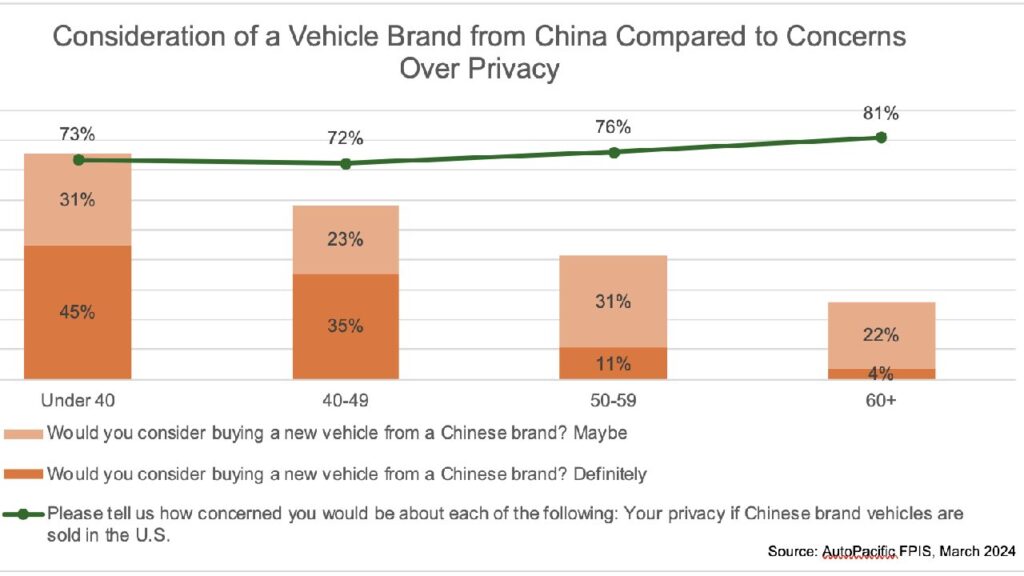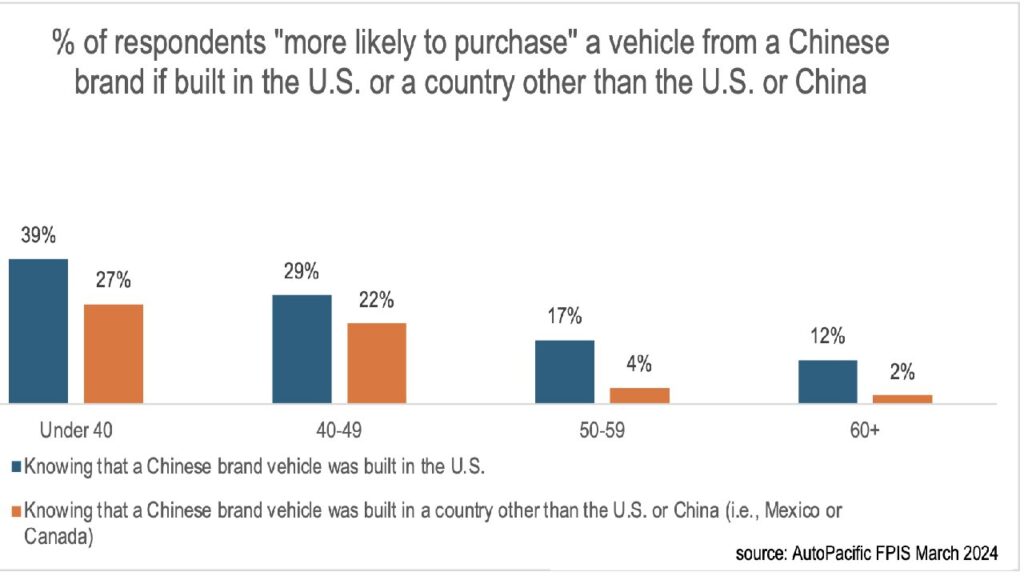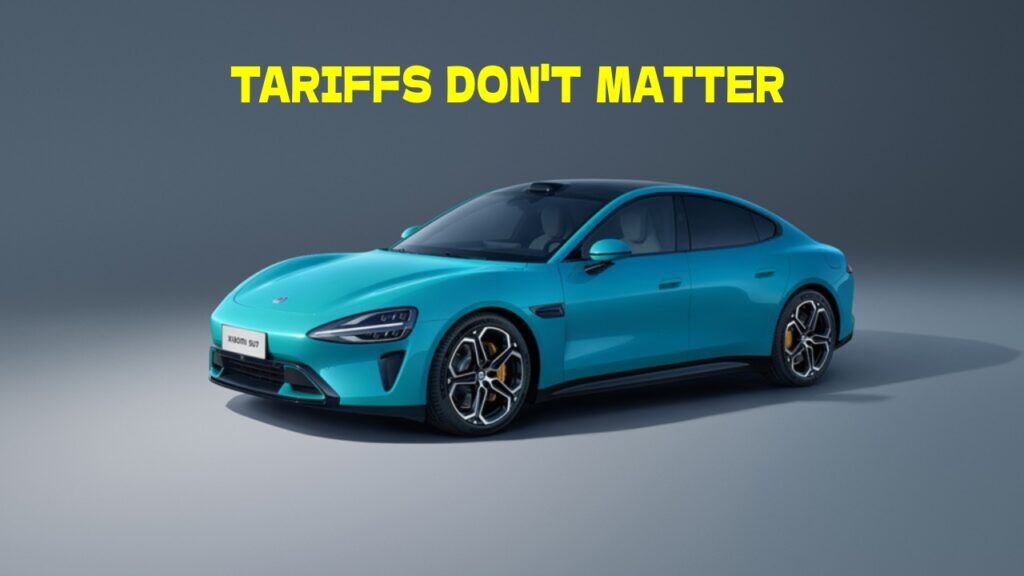The study by AutoPacific also surveyed the reactions of Americans regarding data privacy and national security issues due to Chinese EVs.
The Biden Administration recently announced 100% tariffs on Chinese EVs up from 25%, from August 1, 2024. Biden claims that this move will protect local jobs. Not just that, the batteries from China will also attract tariffs at 25% up from 7.5%. However, that will come into effect on January 1, 2026. A year prior to that, i.e., January 1, 2025, 50% tariffs will be imposed on semiconductors as well.
Note that the tariffs are applicable to BEVs, as well as plug-in hybrid cars. It goes without saying that the U.S. government is adamant about restricting Chinese automobile products on its soil. The U.S. Trade Representative will open a 30-day period for public comment to close on June 28. Amidst all this, a survey by AutoPacific showcases some interesting trends.

You might also like: Canada And Australia Join Hands To Tackle China In EV Battery Tech
Americans Open to Chinese EVs Despite Tariffs
The results come from a proprietary panel of vehicle owners in the U.S. as a part of AutoPacific’s bi-monthly Fuel Price Impact Survey. Nearly 800 respondents, aged 18 to 80, were asked a specific set of questions about Chinese-brand vehicles and privacy concerns. Interestingly, 76% of those under the age of 40 said they would consider buying a vehicle from a Chinese company. This number dropped to just 26% when considering respondents aged 60 and above.
Talking about privacy issues, 44% of respondents said they would be ‘very concerned’ about their privacy if Chinese vehicles were sold in the U.S., while 34% would be ‘somewhat concerned’. Under the age of 40, 73% of respondents said they would be concerned about their privacy. Intriguingly, Ed Kim, President and Chief Analyst at AutoPacific said, “Privacy concerns about Chinese-brand vehicles are likely to eventually subside given that most of the connected smartphones, smart watches, laptops, connected home devices we are comfortable using every day are in fact manufactured in China.”
Furthermore, 68% to 82% (depending on age group), share similar concerns about potential national security risks if Chinese car manufacturers were to sell their vehicles in the U.S. This is true irrespective of whether the vehicles are produced in China, the U.S. or any other country including Mexico. Mexico becomes particularly crucial because Chinese carmakers are considering building manufacturing facilities there which would allow them to bypass a lot of tariffs. This is where things get heated up.
A whopping 73% of respondents under 40 said that they would ‘definitely or maybe consider’ a Chinese-brand vehicle made in Mexico. This number plummets to just 29% when considering the age group of 60 or older. Hence, younger Americans are certainly more open to the idea of considering Chinese vehicles. Chinese EVs are popular on social media due to affordability and tech on offer.

You might also like: EV Batteries Made in Europe To Be 60% Less Carbon Intensive Than Chinese – Study
Learn Electric Cars Says
Now, I understand that the survey pool was not too wide for us to jump to any conclusions. Still, it gives a concrete indication of the kind of trends prevalent in the U.S. auto market. Youngsters, not just in America, but across the globe, are consuming content related to Chinese EVs on social media. The innovation, technology, cutting-edge software, hyper-fast charging speeds, myriads of cool features and affordability are the top reasons which are selling them this idea of Chinese EVs being better than others. In all honesty, one can’t ignore these factors.
The U.S. is taking extreme measures to control Chinese dominance in the auto industry. However, industry veterans like Stellantis CEO, Carlos Tavares want to take on Chinese carmakers (or EVs) without relying on tariffs. He calls these measures “Darwinian”. Talking to Reuters, he said, “When you fight against the competition to absorb 30% of cost competitiveness edge in favor of the Chinese, there are social consequences. But the governments, the governments of Europe, they don’t want to face that reality right now.” In any case, I shall cover further developments in this case.


Pingback: SSI Pro Courses
Pingback: slotxo เล่นง่าย โบนัสแตก
Pingback: รับจํานํารถ
Pingback: แพ็คเกจทัวร์
Pingback: 10 mg vyvanse
Pingback: โปรโมชั่น
Pingback: 入金不要ボーナス
Pingback: สายมัลติคอร์
Pingback: chatrooms
Pingback: เช่าห้องเก็บของ
Pingback: รับจัดงานศพ
Pingback: free deals
Pingback: คลินิกเสริมความงาม
Pingback: PGSLOT โบนัสแตกสนั่น ปั่นเกมไหนโบนัสก็แตก ฝากถอนออโต้
Pingback: Canada Responds With 25% Tariffs On U.S. Cars And More
Pingback: Giriş yapmak
Pingback: REC1688
Pingback: bacon999 สล็อตเว็บตรง
Pingback: th168
Pingback: สั่งซื้อ หวยออนไลน์
Pingback: Thai Massage Manhattan
Pingback: เกียรติบัตรฟรี
Pingback: เว็บมวยไทยออนไลน์ ราคาดีจ่ายแพงที่สุด Lsm99
Pingback: blazing crown
Pingback: new88
Pingback: ร้านเค้กวันเกิดใกล้ฉัน
Pingback: essentials
Pingback: Lsm99 สมัครสมาชิก ระบบ ฝาก - ถอน ออโต้
Pingback: altogel
Pingback: รับจด อย